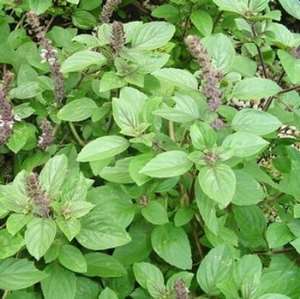
African basil (Ocimum gratissimum), commonly known as scent leaf, is a widely utilized herb in African traditional medicine and culinary practices. Rich in essential oils, flavonoids, and phenolic compounds, African basil exhibits antimicrobial, anti-inflammatory, and immunomodulatory properties. This review explores its pharmacological effects, including its role in cardiovascular health, digestive function, and disease prevention. As the demand for natural therapeutics rises, O. gratissimum holds promise in both conventional and integrative medicine, offering sustainable health benefits.
Introduction
Herbs and medicinal plants have been integral to traditional healing systems for centuries. African basil (Ocimum gratissimum), a member of the Lamiaceae family, is widely cultivated in tropical and subtropical regions, where it is valued for its aromatic properties, culinary applications, and therapeutic potential. Known for its characteristic scent and rich phytochemical profile, African basil is extensively used in African ethnomedicine for managing infections, digestive disorders, and inflammatory conditions.
This review examines the scientific evidence supporting African basil’s health benefits, including its phytochemical composition, medicinal applications, and potential in modern integrative medicine.
Phytochemical Composition
The medicinal properties of African basil stem from its diverse bioactive compounds. Key constituents include:
Essential Oils: Contains eugenol, thymol, and linalool, which exhibit antimicrobial and anti-inflammatory effects (Akinmoladun et al., 2021). Flavonoids: Known for their antioxidant and cardiovascular protective functions (Adegbite et al., 2020). Tannins and Phenolic Compounds: Contribute to its antimicrobial and gastrointestinal benefits (Olorunfemi et al., 2019). Saponins: Play a role in cholesterol reduction and immune modulation (Igwe et al., 2022).
Health Benefits of African Basil
Antimicrobial and Antifungal Activity
African basil possesses strong antimicrobial properties, making it effective in combating bacterial and fungal infections. Studies suggest that its essential oils can inhibit Staphylococcus aureus, Escherichia coli, and Candida albicans (Adetuyi et al., 2020). This supports its traditional use in treating respiratory and gastrointestinal infections.
Anti-Inflammatory and Antioxidant Effects
Oxidative stress and chronic inflammation are implicated in various diseases, including cardiovascular disorders and neurodegenerative conditions. African basil’s high flavonoid and polyphenol content contributes to its antioxidant potential, helping to neutralize free radicals and reduce cellular damage (Ugochukwu et al., 2021).
Cardiovascular Health
The essential oils and flavonoids in African basil have demonstrated vasodilatory and hypotensive effects, supporting heart health. Research indicates that regular consumption can reduce blood pressure and improve lipid metabolism by lowering LDL cholesterol levels (Bello et al., 2018).
Digestive Health and Gastrointestinal Support
African basil is traditionally used for treating indigestion, constipation, and bloating. Its tannins and phenolic compounds aid in gastrointestinal motility and support gut microbiota balance. Additionally, its antibacterial properties help mitigate foodborne infections (Ekwueme et al., 2019).
Immunomodulatory Effects
Emerging studies highlight African basil’s role in immune enhancement. Its bioactive compounds stimulate immune cells, helping the body resist infections and modulate inflammatory responses. Traditional herbal formulations containing African basil have been used to support immune function in individuals with viral and bacterial diseases (Okoye et al., 2022).
Potential Applications in Naturopathic Medicine
Given its broad therapeutic potential, African basil is increasingly incorporated into naturopathic and holistic medicine practices. Its applications include:
Aromatherapy: Used in essential oil blends for respiratory health and mental relaxation. Herbal Infusions: Consumed as tea for digestive and metabolic benefits. Topical Preparations: Applied as extracts for wound healing and skin infections.
Conclusion
African basil (Ocimum gratissimum) stands as a valuable medicinal plant with diverse health applications. Its phytochemical richness supports its antimicrobial, anti-inflammatory, cardiovascular, and digestive benefits, making it a staple in both traditional and modern therapeutic practices. As interest in natural medicine grows, African basil continues to be a subject of scientific research, offering potential advancements in disease prevention and integrative health care.
About the Author:
Prof. Raphael Nyarkotey Obu is a Professor of Naturopathic Healthcare, Lawyer(Gambia Bar), and a Chartered Health Economist


